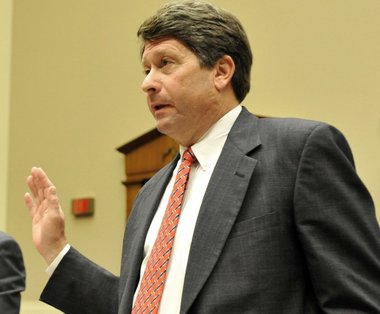The former president of the Lynchburg-based peanut company at the heart of a food-poisoning outbreak that sickened more than 700 and killed at least nine people, is going back to court to keep investigators away from company records.
The News & Advance reports that Stewart Parnell asked a judge earlier this month to stop the lawyer who administered Peanut Corp. of America’s bankruptcy from turning over records to the Department of Justice. Parnell claims some of those records may contain emails to his lawyer that shouldn’t be used against him in a criminal case.
Parnell and Peanut Corp. were subjects of Food and Drug Administration and congressional investigations, and by late January 2009, the Department of Justice and the FDA announced a  criminal investigation. Parnell appeared before a congressional subcommittee on Feb. 9, 2009, but invoked his Fifth Amendment right against self-incrimination.
criminal investigation. Parnell appeared before a congressional subcommittee on Feb. 9, 2009, but invoked his Fifth Amendment right against self-incrimination.
Throughout Feb. 2009, federal agents raided the company’s manufacturing plants and Parnell’s home, which also served as the Peanut Corp. headquarters, seizing documents and computer records. Some of those records made their way to the bankruptcy trustee to help him pay out what was left of the company’s assets.
Parnell’s lawyers note he has not been indicted and has not received a “target letter” sometimes sent to subjects of federal investigations. Spokeswomen for the FDA and for the U.S. Attorney’s office in Macon, Ga., would not comment about the matter Tuesday except to say the investigation is ongoing.

.jpg) And cringing.
And cringing. Parnell sat stiffly, his hands folded in his lap at the witness table, as Rep. Greg Walden, R-Ore., held up a clear jar of his company’s products wrapped in crime scene tape and asked him if he would be willing to eat the food.
Parnell sat stiffly, his hands folded in his lap at the witness table, as Rep. Greg Walden, R-Ore., held up a clear jar of his company’s products wrapped in crime scene tape and asked him if he would be willing to eat the food. Henry Waxman, chairman of the House Committee on Energy and Commerce, was quoted as saying, “This company cared more about its financial bottom line than it did about the safety of its customers.”
Henry Waxman, chairman of the House Committee on Energy and Commerce, was quoted as saying, “This company cared more about its financial bottom line than it did about the safety of its customers.”  Early reporting
Early reporting